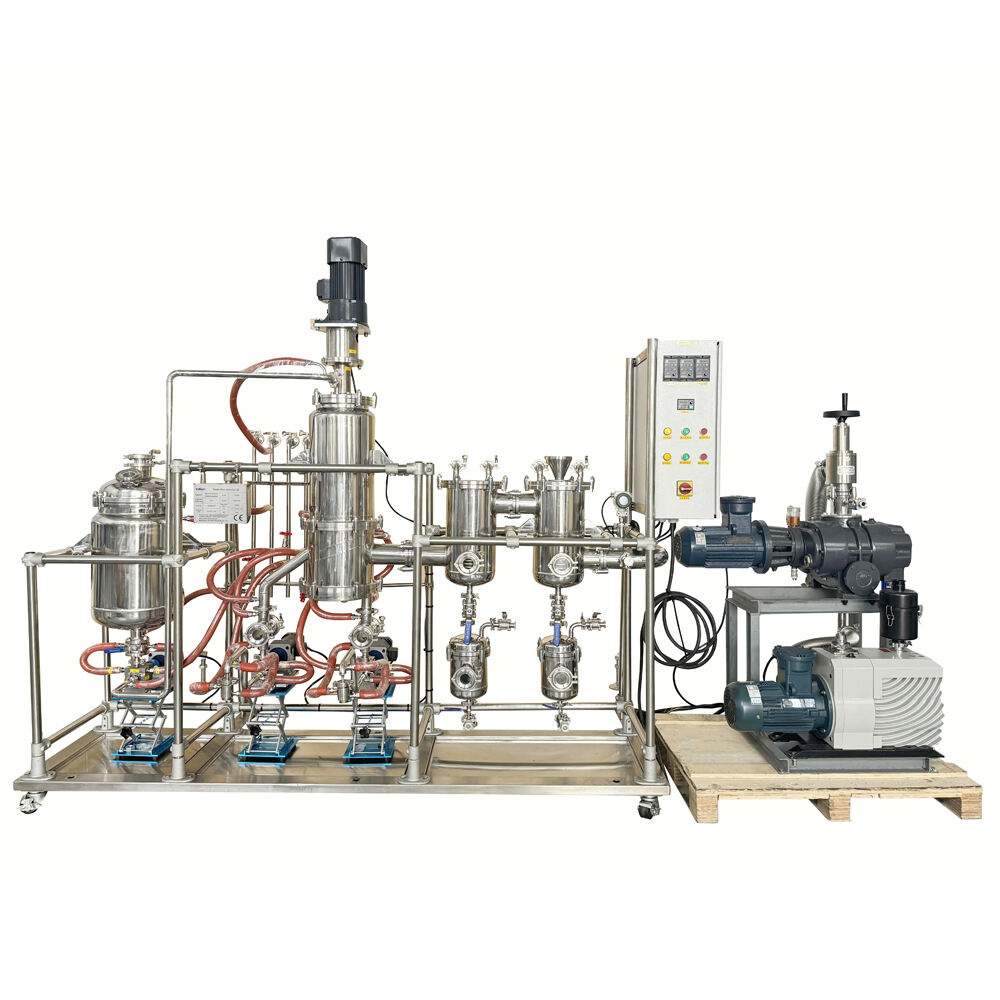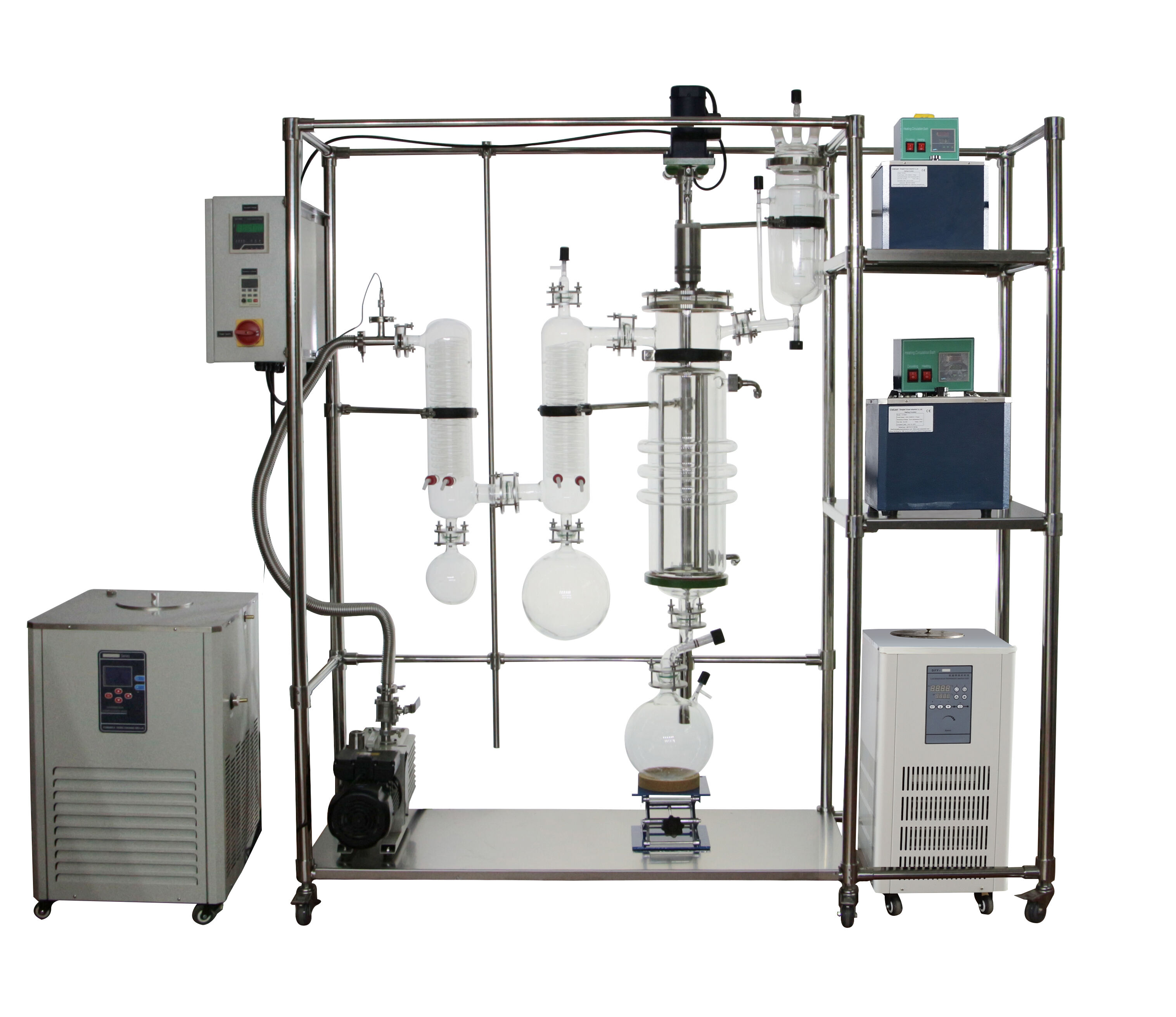Čo zvážiť pred kúpou odparovacieho molekulového filmu Destilačné zariadenia
Zariadenie na molekulárnu destiláciu s utieracou fóliou je špecializovaný nástroj používaný v priemysle, ako je farmaceutický, kozmetický a chemický priemysel, na oddelenie a čistenie zlúčenín citlivých na teplo alebo s vysokou teplotou varu. Na rozdiel od tradičnej destilácie funguje pri vysokom vakuu a nízkych teplotách, čo ho činí ideálnym pre jemné materiály, ktoré by sa mohli pri zahriatí pokaziť. Investícia do Zariadenie na molekulárnu destiláciu s utieracou fóliou je významné rozhodnutie, ktoré ovplyvňuje kvalitu výrobku, efektivitu a dlhodobé náklady. Pred kúpou je potrebné zvážiť viaceré kľúčové faktory, aby ste si vybrali správne zariadenie pre svoje potreby. Táto príručka popisuje najdôležitejšie aspekty, ktoré vám pomôžu urobiť informované rozhodnutie.
Pochopenie vašich potrieb pri použití
Prvým krokom pred kúpou zariadenia na destiláciu odparovacieho molekulového filmu je jasné zadefinovanie vašej aplikácie. Rôzne odvetvia priemyslu a procesy vyžadujú špecifické vlastnosti, takže poznanie vašich potrieb zúži výber možností. Položte si otázky ako:
- Aké materiály budete spracovávať? Pracujete s olejmi, farmáciou, arómami alebo chemikáliami? Každý materiál má jedinečné vlastnosti, ako napríklad viskozita, citlivosť na teplo a letivosť, ktoré ovplyvňujú návrhové požiadavky na zariadenie. Napríklad, kvapaliny s vysokou viskozitou potrebujú výkonnejšie čistiaci mechanizmus na rovnomerné rozprestieranie.
- Aký výstup si želáte? Určite objem produktu, ktorý potrebujete spracovať denne alebo týždenne. Malé laboratóriá môžu potrebovať kompaktné zariadenie s nižšou kapacitou, zatiaľ čo priemyselné zariadenia vyžadujú väčšie systémy na spracovanie vysokého objemu.
- Aká čistota je potrebná? Niektoré aplikácie, ako napríklad výroba liekov, si vyžadujú extrémne vysokú čistotu (99 % alebo viac), na ktorú je potrebná presná kontrola teploty a vákua. Iné, ako napríklad spracovanie potravín, môžu mať nižšie, no stále prísné štandardy čistoty.
- Existujú nejaké predpisy a normy? Priemyselné odvetvia, ako sú farmaceutický a potravinársky, musia dodržať prísne predpisy (napr. normy FDA). Uistite sa, že Vyparovacia Destilačná Jednotka s Pohyblivým Filmom vyhovuje týmto smerniciam, pričom má funkcie, ako je ľahká čistiteľnosť a sledovateľnosť materiálov.
Ak definujete svoju aplikáciu, môžete sa sústrediť na zariadenie, ktoré bude vyhovovať vašim konkrétnym potrebám a vyhnete sa nadbytočným funkciam, ktoré zvyšujú náklady.
Výkon a Produktivita
Výkon označuje maximálne množstvo materiálu, ktoré Vyparovacia Destilačná Jednotka s Pohyblivým Filmom dokáže spracovať za určitý čas, často udávané v litroch za hodinu (L/h) alebo kilogramoch na dávku. Výber správneho výkonu je kľúčový na predídenie výrobným úzkejším miestam alebo na predídenie plýtvaniu energiou nadmernou veľkosťou zariadenia.
- Zariadenie na malú výrobu : Určené pre laboratóriá alebo pilotné projekty, tieto systémy spracovávajú typicky 0,5–5 L/h. Sú kompaktné, ľahko ovládateľné a ideálne na testovanie nových procesov alebo výrobu malých dávok.
- Zariadenie na strednú výrobu : vhodné pre malé až stredné výrobné zariadenia s kapacitou od 5–50 l/h. Tieto systémy ponúkajú rovnováhu medzi výkonom a flexibilitou a sú vhodné pre rastúce podniky.
- Zariadenie veľkého formátu : priemyselné systémy schopné spracovať viac než 50 l/h, určené pre vysoké výrobné objemy. Často disponujú automatickým ovládaním a odolnými komponentmi, ktoré vydržia nepretržité používanie.
Zvážte nielen aktuálne potreby, ale aj budúci rast. Investovanie do trochu väčšej kapacity, než je momentálna potreba, môže ušetriť náklady v budúcnosti, keďže rozšírenie na väčší systém je často nákladnejšie než kúpa väčšieho systému hneď na začiatku.
Výkon vákuového systému
Zariadenie na molekulovú destiláciu s brúsenou fóliou využíva vysoké vákuum na zníženie bodov varu materiálov, čo umožňuje separáciu pri nízkych teplotách. Výkon vákuového systému priamo ovplyvňuje efektivitu zariadenia a kvalitu výsledného produktu. Kľúčové faktory na vyhodnotenie zahŕňajú:
- Úroveň vakúa : Hľadajte vybavenie, ktoré dokáže dosiahnuť a udržať vákuum v rozsahu 0,001–1 mmHg (milimetre ortuťového stĺpca). Nižší tlak (vyššie vákuum) umožňuje oddelenie citlivejších zlúčenín na teplo. Skontrolujte, či systém využíva spoľahlivé vákuové pumpy (lamelové, difúzne alebo turbomolekulárne), ktoré zodpovedajú požadovanému rozsahu tlaku.
- Stabilita vákuua : Kolísanie tlaku vo vákuu môže spôsobiť nerovnomerné varenie a zlú separáciu. Vyberte vybavenie s pokročilými snímačmi a regulátormi tlaku, ktoré udržiavajú stabilnú úroveň vákuua počas celého procesu.
- Údržba vákuovej pumpy : Niektoré vákuové pumpy vyžadujú častú výmenu oleja alebo náhradné diely. Zvážte dlhodobé náklady na údržbu a vyberte pumpy známe svojou odolnosťou a ľahkou údržbou.
Systém vysokokvalitného vákuua zabezpečuje stále výkony, vyššiu čistotu a znížené riziko tepelného poškodenia vašich materiálov.

Konštrukcia očistného mechanizmu
Mechanizmus čistenia je kľúčovou súčasťou zariadenia molekulárnej destilácie s tenkou vrstvou, ktorý je zodpovedný za rovnomerné rozprestieranie kvapaliny do tenkej vrstvy na stenách vyhrievanej komory. Chybný návrh môže viesť k nerovnomernej hrúbke vrstvy, neúplnej vypareniu a nízkej výťažnosti produktu. Pri hodnotení mechanizmov čistenia zvážte:
- Typ čističa : Väčšina systémov využíva nože alebo valce vyrobené z materiálov ako PTFE (Teflón), nehrdzavejúca oceľ alebo keramika. PTFE je ideálny pre korozívne materiály, zatiaľ čo nehrdzavejúca oceľ zaručuje odolnosť pre kvapaliny s vysokou viskozitou.
- Rýchlosť otáčania : Rýchlosť čističa (udávaná v otáčkach za minútu) ovplyvňuje hrúbku vrstvy. Nastaviteľné rýchlosti umožňujú prispôsobiť sa rôznym viskozitám materiálov – vyššie rýchlosti pre husté kvapaliny, nižšie rýchlosti pre riedke kvapaliny.
- Jednotnosť : Hľadajte mechanizmy, ktoré zabezpečujú rovnomerné pokrytie celej plochy steny komory. Funkcie ako pružinové nože alebo viacero rovnomerne rozmiestnených čističov pomáhajú udržať konzistentnosť aj počas opotrebovania čistiacich lopatiek.
- Ľahké čistenie : Vymazávače môžu zachytiť zvyšky, takže vyberte si výrobky, ktoré sa ľahko odstránia a čistia. To je obzvlášť dôležité pre aplikácie vyžadujúce prísnu hygienu, ako sú potraviny alebo lieky.
Dobre navrhnutý mechanismus utriania zabezpečuje efektívny prenos tepla a odparovanie, čo priamo zlepšuje kvalitu a výnos výrobku.
Možnosti regulácie teploty
Precízna kontrola teploty je nevyhnutná pre zariadenia na molekulárnu destilaciu s vymazaným filmom, pretože určuje, ktoré zlúčeniny sa odparia a oddelia. Zariadenie by malo vykurovať stenu komory a ochladiť kondenzátor s presnosťou na zameranie na špecifické molekuly. Kľúčové úvahy zahŕňajú:
- Spôsob ohrevu : Väčšina systémov používa zakryté komory ohrievané olejom, vodou alebo elektrickými ohrievačmi. Olejové vykurovanie ponúka lepšiu teplotnú rovnomernosť, zatiaľ čo elektrické ohrievače sa ľahšie ovládajú. Vyberte metódu, ktorá zodpovedá vašim potrebám v rozsahu teplôt (obvykle 50250°C).
- Presnosť teploty : Hľadajte vybavenie s digitálnymi regulátormi, ktoré udržiavajú teplotu v rozsahu ±0,5 °C. Táto presnosť zabezpečuje rovnomernú separáciu a zabraňuje prehriatiu citlivých materiálov.
- Konštrukcia kondenzátora : Kondenzátor musí efektívne chladiť pary, aby sa maximalizovala recyklácia produktu. Mal by mať veľkú plochu povrchu a nastaviteľné chladenie (pomocou vody alebo chladivá), aby zodpovedal teplote pár. Niektoré systémy sú vybavené dvojitými kondenzátormi na oddelenie viacerých zložiek v jednom cykle.
Dobrá regulácia teploty minimalizuje stratu produktu, znižuje spotrebu energie a zabezpečuje požadovanú čistotu.
## Kvalita materiálu a trvanlivosť
Materiály použité vo vybavení pre molekulovú destiláciu s očistným filmom ovplyvňujú jeho trvanlivosť, čistotu a kompatibilitu s vašimi produktmi. Menejcenné materiály môžu korodovať, kontaminovať produkty alebo sa rýchlo opotrebovať, čo vedie k častým opravám.
- Komora a očistné lišty : Destilačná komora a stieračky by mali byť vyrobené z koróziou odolných materiálov. Bežným materiálom je nehrdzavejúca oceľ (316L je ideálna pre vysokú čistotu), ktorá odoláva väčšine chemikálií a ľahko sa čistí. Pre agresívne materiály zvážte komory z Hastelloy alebo skleneného povlaku.
- Peňovky a uzátvorky : Tieto zabezpečujú proti únikom vákua a kontaminácii. Vyberte kvalitné materiály ako Viton alebo PTFE, ktoré odolávajú teplu, chemikáliám a opotrebeniu. Vymeniteľné tesnenia uľahčujú údržbu.
- Rám a komponenty : Rám zariadenia by mal byť odolný (často z nehrdzavejúcej ocele), aby podporoval ťažké komponenty a znížil vibrácie počas prevádzky. Pohyblivé časti (ako motory a prevody) by mali byť odolné, aby vydržali nepretržité používanie.
Investovanie do kvalitných materiálov znižuje náklady na údržbu a predlžuje životnosť zariadenia, čo znamená lepšiu dlhodobú investíciu.
Automatizácia a priateľské použitie
Moderné zariadenie na molekulárnu destiláciu s tenkovrstvovým odparovaním často obsahuje automatizačné funkcie, ktoré uľahčujú prevádzku a zlepšujú konzistenciu. Úroveň automatizácie, ktorú potrebujete, závisí od odbornosti vášho tímu a výrobných požiadaviek:
- Manuálne systémy : Základné ovládanie teploty, vákua a rýchlosti terča, ktoré sa ovládajú ručne. Sú vhodné pre laboratóriá alebo malé série, kde môžu operátori proces pozorne sledovať.
- Poloautomatické systémy : Digitálne regulátory, ktoré umožňujú nastaviť parametre (teplota, vákuum, rýchlosť dávkovania) a ukladať režimy pre opakovateľné procesy. Môžu obsahovať alarmy pre výkyvy tlaku alebo teploty.
- Plne automatické systémy : Priemyselné zariadenie s PLC (Programovateľnými logickými regulátormi), ktoré riadia všetky procesy automaticky. Tieto systémy sa integrujú do výrobných linkov, sledujú údaje a vyžadujú minimálny zásah operátora.
Používateľská prívetivosť je tiež dôležitá. Hľadajte jasné rozhrania, ľahko prístupné komponenty na čistenie a podrobné manuály alebo školiace podpory od výrobcu. Tým sa skráti doba školenia a zníži riziko ľudských chýb.
Náklady a celkové vlastníctvo
Počiatočná cena odparovacieho zariadenia s tenkou vrstvou je významná, no je dôležité zvážiť celkové náklady na vlastníctvo, ktoré zahŕňajú:
- Nákupná cena : Porovnajte ponuky od rôznych dodávateľov, ale vyhýbajte sa výberu výhradne na základe ceny – lacnejšie zariadenie môže postrádať kľúčové funkcie alebo využívať materiály nízkej kvality.
- Náklady na inštaláciu : Rozsiahle systémy môžu vyžadovať profesionálnu inštaláciu vrátane potrubných rozvodov, elektrických prác a nastavenia vakuových línií. Zahrňte tieto náklady do vášho rozpočtu.
- Údržba a opravy : Pravidelná údržba (ako výmena tesnení, servis vakuového čerpadla a čistenie) pridáva na nákladoch. Vyberte si zariadenie s ľahko dostupnými náhradnými dielmi a s dodávateľom ponúkajúcim rýchlu podporu.
- Spotreba energie : Efektívne systémy s dobrým izolovaním a presnými ovládacími prvkami znížia spotrebu energie a tým aj dlhodobé náklady.
Vyžiadajte si ponuky, ktoré zahŕňajú inštaláciu, školenie a záručnú lehotu (ideálne 1–2 roky), aby ste predišli neočakávaným nákladom.
Podpora a renomé dodávateľa
Výber spoľahlivého dodávateľa je rovnako dôležitý ako výber správneho zariadenia. Dobrý dodávateľ poskytuje podporu pred, počas a po nákupu:
- Skúseností hľadajte dodávateľov s overenou výkonnosťou v oblasti vášho odvetvia. Požiadajte o referencie alebo štúdie prípadov z podobných aplikácií.
- Technická podpora uistite sa, že dodávateľ ponúka školenie pre váš tím, ako aj kontinuálnu technickú podporu pri riešení problémov.
- Dostupnosť náhradných dielov rýchly prístup k náhradným dielom (ako sú stierače, tesnenia a komponenty vákuového čerpadla) minimalizuje výpadky v prípade potreby opráv.
- Možnosti prispôsobenia ak má vaša aplikácia špecifické požiadavky, skontrolujte, či dodávateľ môže prispôsobiť zariadenie (napr. väčšie kondenzátory, špeciálne materiály).
Reputabilný dodávateľ vám pomôže vybrať správne zariadenie a bude vás podporovať počas celého jeho životného cyklu.
Často kladené otázky
Aký je rozdiel medzi destiláciou s rušenou tenkou vrstvou a inými typmi molekulovej destilačnej techniky?
Zariadenie na molekulárnu destiláciu s vyžlebovanou fóliou využíva rotačný vyžlebovač na vytvorenie tenkej kvapalinovej vrstvy, čo umožňuje rýchlejšiu a efektívnejšiu separáciu v porovnaní so statickými filmovými systémami. Zvláda spracovanie viskóznejších látok a zabezpečuje vyššiu čistotu produktu.
Ako často potrebuje zariadenie na molekulárnu destiláciu s vyžlebovanou fóliou údržbu?
Frekvencia údržby závisí od použitia a spracovávaných materiálov. Spravidla je potrebné meniť vyžlebovače a tesnenia každé 3–6 mesiacov, zatiaľ čo vakuové pumpy vyžadujú servis každých 6–12 mesiacov. Pravidelné čistenie po každej dávke zabraňuje usadzovaniu zvyškov.
Vie zariadenie na molekulárnu destiláciu s vyžlebovanou fóliou spracovať letné zlúčeniny?
Áno, jeho vysokovakuumový systém zníži bod varu, čo umožňuje bezpečné spracovanie letných zlúčenín bez nadmerných strát pár alebo degradácie.
Je na obsluhu tohto zariadenia potrebné špeciálne školenie?
Áno, najmä pri automatických systémoch. Dodávatelia zvyčajne poskytujú školenie, aby obsluha pochopila ovládanie teploty, vákua a dávkovacieho systému, ako aj bezpečnostné protokoly.
Aká záručná lehota sa očakáva?
Väčšina dodávateľov ponúka záručnú lehotu 1–2 roky na diely a prácu. Niektorí môžu predĺžiť záručnú lehotu pre kritické komponenty, ako sú vákuové pumpy alebo ohrievače, za príplatok.
Obsah
- Pochopenie vašich potrieb pri použití
- Výkon a Produktivita
- Výkon vákuového systému
- Konštrukcia očistného mechanizmu
- Možnosti regulácie teploty
- ## Kvalita materiálu a trvanlivosť
- Automatizácia a priateľské použitie
- Náklady a celkové vlastníctvo
- Podpora a renomé dodávateľa
-
Často kladené otázky
- Aký je rozdiel medzi destiláciou s rušenou tenkou vrstvou a inými typmi molekulovej destilačnej techniky?
- Ako často potrebuje zariadenie na molekulárnu destiláciu s vyžlebovanou fóliou údržbu?
- Vie zariadenie na molekulárnu destiláciu s vyžlebovanou fóliou spracovať letné zlúčeniny?
- Je na obsluhu tohto zariadenia potrebné špeciálne školenie?
- Aká záručná lehota sa očakáva?

